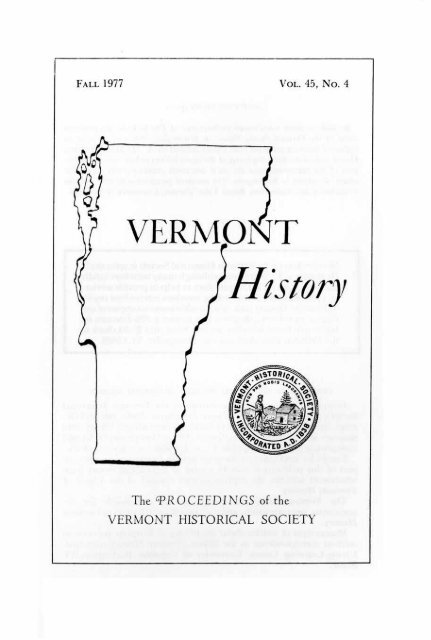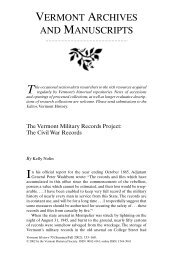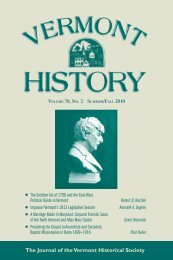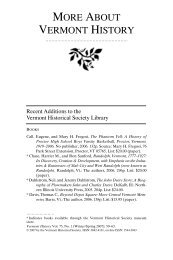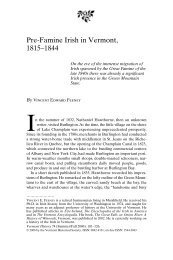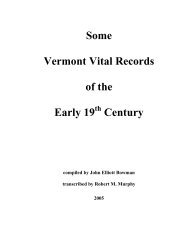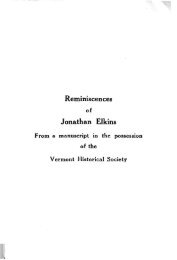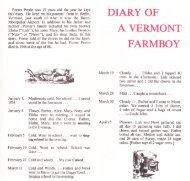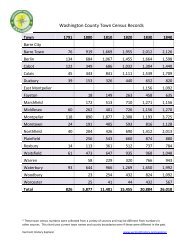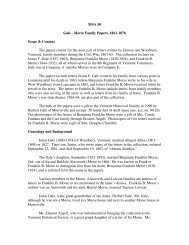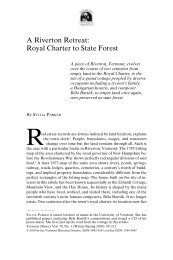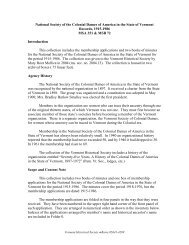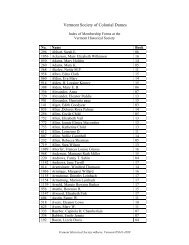Dark Mountain: H. P. Lovecraft and the - Vermont Historical Society
Dark Mountain: H. P. Lovecraft and the - Vermont Historical Society
Dark Mountain: H. P. Lovecraft and the - Vermont Historical Society
You also want an ePaper? Increase the reach of your titles
YUMPU automatically turns print PDFs into web optimized ePapers that Google loves.
FALL 1977<br />
VOL. 45, No.4<br />
History<br />
The GFROCEEDINGS of <strong>the</strong><br />
VERMONT HISTORICAL SOCIETY
"... my object in writing 'The Whisperer<br />
in <strong>the</strong> <strong>Dark</strong>ness' was not just to be weird,<br />
but primarily to crystallise a powerful<br />
imaginative impression given me by a<br />
certain [<strong>Vermont</strong>] l<strong>and</strong>scape,"<br />
<strong>Dark</strong> <strong>Mountain</strong>: H. P. <strong>Lovecraft</strong> <strong>and</strong><br />
The '<strong>Vermont</strong> Horror'<br />
By ALAN S. WHEELOCK<br />
The literary reputation of Howard Phillips <strong>Lovecraft</strong> (1890<br />
1937) has vacillated between near-obscurity <strong>and</strong> uncritical adulation.<br />
Writing in 1945, Edmund Wilson stated that "<strong>Lovecraft</strong> was<br />
not a good writer. The fact that his verbose <strong>and</strong> undistinguished<br />
style has beenccympared to Poe's is only one of <strong>the</strong> many sad signs<br />
that almost nobody any more pays any real attention to writing.")<br />
Writing in 1975, <strong>Lovecraft</strong>'s most recent biographer, L. Sprague<br />
de Camp, wrote enthusiastically that "He has been hailed not only<br />
as <strong>the</strong> equal of Poe but even as one of <strong>the</strong> greatest writers of all<br />
time. "2 Among <strong>the</strong> very few areas of agreement about <strong>Lovecraft</strong>'s<br />
stature as a writer, however, is "The Whisperer in <strong>Dark</strong>ness," a<br />
long short story of 26,000 words he wrote in 1930, <strong>and</strong> published<br />
in Weird Tales Magazine in August, 1931. The <strong>the</strong>me of <strong>the</strong> story<br />
is typical of <strong>Lovecraft</strong>'s fiction, but <strong>the</strong> setting is unique; "The<br />
Whisperer in <strong>Dark</strong>ness" takes place in Windham County, <strong>Vermont</strong>.<br />
Born in Providence, Rhode Isl<strong>and</strong>, like his fellow New Engl<strong>and</strong>er,<br />
Nathaniel Hawthorne, whose work he admired greatly,<br />
<strong>Lovecraft</strong> knew that <strong>the</strong> bright, commercial day of coastal New<br />
Engl<strong>and</strong> was over. He felt a strong attachment toward <strong>the</strong> venerable<br />
antiquity of his town - its narrow, crooked streets <strong>and</strong> crumbling<br />
wharves - made stronger still by <strong>the</strong> persistence of <strong>the</strong> family name<br />
in <strong>the</strong> neighborhood for many, many years, The long association<br />
with one place created, in Hawthorne's words, "a kindred between<br />
<strong>the</strong> human being <strong>and</strong> <strong>the</strong> locality, quite independent of any<br />
charm in <strong>the</strong> scenery. , .. It is not love, but instinct."3 Sense of place<br />
<strong>and</strong> <strong>the</strong> spirit of <strong>the</strong> physical setting exerted a powerful influence on<br />
<strong>Lovecraft</strong> <strong>and</strong> on his writing.<br />
221
In 1921 <strong>Lovecraft</strong> met Mrs. Sonia Greene at an amateur wnters'<br />
convention in Boston. They became great friends <strong>and</strong> carried on an<br />
extensive correspondence. The divorcee persuaded <strong>the</strong> author to<br />
come to New York City, where she was active in amateur literary<br />
circles. At thirty-one, he had never been far<strong>the</strong>r from home than<br />
New York, where he made frequent <strong>and</strong> regular trips, <strong>and</strong> after<br />
marrying Mrs. Greene, moved in 1924. In <strong>the</strong> city <strong>the</strong> <strong>Lovecraft</strong>s<br />
joined <strong>the</strong> Kalem Club, a literary-discussion group which included<br />
some of <strong>the</strong> writers <strong>and</strong> journalists he had known earlier in <strong>the</strong><br />
Boston convention days. <strong>Lovecraft</strong> also renewed his acquaintance<br />
with <strong>the</strong> Great Houdini, whose newspaper articles devoted to exposing<br />
mediums <strong>and</strong> clairvoyants <strong>Lovecraft</strong> often ghosted. In 1928<br />
at a club meeting he met a young <strong>Vermont</strong>er from <strong>the</strong> staff of<br />
Mencken's American Mercury magazine, Vrest Orton.<br />
The friendship between <strong>the</strong>se two proved durable. Orton respected<br />
<strong>Lovecraft</strong>'s editorial abilities, <strong>and</strong> when he moved later in <strong>the</strong> year<br />
to Brattleboro to found <strong>the</strong> Stephen Daye Press, he asked <strong>Lovecraft</strong><br />
to accompany him to <strong>Vermont</strong> to become his editor. 4 <strong>Lovecraft</strong><br />
refused on <strong>the</strong> grounds that <strong>the</strong> climate would surely kill him.<br />
He did, however, accept Orton's invitation in <strong>the</strong> summer of 1928<br />
to motor to Windham County for a long weekend at <strong>the</strong> family<br />
home in Old Guilford. <strong>Lovecraft</strong> remembers <strong>the</strong> trip as a "marvelous<br />
pleasure & mental stimulation," that brought him "magically<br />
close to those basic & surviving wellsprings of early American life."<br />
Life in <strong>Vermont</strong>, he thought, had "gone on in <strong>the</strong> same way since<br />
before <strong>the</strong> Revolution - <strong>the</strong> same l<strong>and</strong>scape, buildings, families,<br />
occupations & modes of thought & speech. "5<br />
The weekend at <strong>the</strong> Orton home in sou<strong>the</strong>rn <strong>Vermont</strong> made a<br />
profound impression on <strong>Lovecraft</strong>'s creative imagination. This was<br />
wild country to a man whose life had centered almost exclusively<br />
around Providence <strong>and</strong> New York. It presented an ideal setting<br />
for a fantastic tale, <strong>and</strong> when asked later by a fellow-writer about<br />
<strong>the</strong> genesis of "The Whisperer in <strong>Dark</strong>ness," he replied that "it is<br />
certainly a substantial artistic feat to bring <strong>the</strong> unreal into <strong>the</strong> midst<br />
of <strong>the</strong> every day ... crystallising certain natural sentiments connected<br />
with distant or rarely observed scenes or phenomena. To use<br />
a personal example, - my object in writing 'The Whisperer in<br />
<strong>Dark</strong>ness' was not just to be weird, but primarily to crystallise a<br />
powerful imaginative impression given me by a certain l<strong>and</strong>scape."6<br />
That "certain l<strong>and</strong>scape" was <strong>the</strong> West River country of<br />
Windham County, <strong>Vermont</strong>.<br />
The catalyst necessary to crystallize <strong>the</strong> impressions <strong>Vermont</strong><br />
made on <strong>the</strong> author waited for nearly two years. It came in 1930,<br />
with <strong>the</strong> announcement by <strong>the</strong> scientific community of <strong>the</strong> discovery<br />
of a ninth planet in our solar system - Pluto was sighted by<br />
<strong>the</strong> American astronomer C. W. Tombaugh, largely as a result of<br />
222
tween <strong>the</strong> two, for Akeley views <strong>the</strong> newspaper debate as too public<br />
a forum for what he has to reveal. He also forwards a series of<br />
photographs for Wilmarth's perusal. Taken in <strong>the</strong> Newfane-Townshend<br />
area, <strong>the</strong> photographs purport to show odd "claw-prints"<br />
along dusty roads, a strange cave on <strong>the</strong> slope of Round Hill, <strong>and</strong><br />
a "druid-like circle of st<strong>and</strong>ing stones on <strong>the</strong> summit of a wild hill."<br />
They also include a snapshot of a hewn black monolith, one of<br />
Akeley himself, <strong>and</strong> one of his home, "a trim white house of two<br />
storeys <strong>and</strong> attic, about a century <strong>and</strong> a quarter old, <strong>and</strong> with a<br />
well-kept lawn <strong>and</strong> stone-bordered path leading up to a tastefully<br />
carved Georgian doorway."13<br />
In his letters, Akeley labels <strong>the</strong> o<strong>the</strong>r worldly things a vanguard of<br />
off-world explorers from an undiscovered planet beyond <strong>the</strong> orbit of<br />
Neptune, a place called Yuggoth (Pluto), who also have a base<br />
somewhere in <strong>the</strong> Himalayas - a good example of <strong>the</strong> staggering<br />
effect <strong>the</strong> Green <strong>Mountain</strong>s had on <strong>Lovecraft</strong>'s fertile imagination.<br />
The things, Akeley explains, operate an extensive mining operation,<br />
with tunnels well into some Green <strong>Mountain</strong> peaks, where <strong>the</strong>y<br />
busily extract some unspecified metallic ores. Dangerous only if<br />
distracted from this primary mission, <strong>the</strong> things, according to oral<br />
tradition of stories of strange buzzing sounds heard among <strong>the</strong><br />
mountains, go as far back as <strong>the</strong> time of <strong>the</strong> Indians. Akeley claims<br />
to have heard <strong>the</strong>se sounds <strong>and</strong> has even recorded <strong>the</strong>m on a<br />
dictaphone cylinder. His attempt to substantiate his bizarre story<br />
by sending Wilmarth a piece of <strong>the</strong> black stone via railway express<br />
is thwarted when an unidentified person removes <strong>the</strong> package<br />
from a Boston <strong>and</strong> Maine baggage car at Keene, New Hampshire.<br />
Akeley fears <strong>the</strong> creatures <strong>and</strong> warns prophetically that <strong>the</strong>y<br />
must be left alone. "With promoters <strong>and</strong> real estate flooding <strong>Vermont</strong><br />
with herds of summer people to overrun <strong>the</strong> wild places <strong>and</strong><br />
cover <strong>the</strong> hills with cheap bungalows, "<strong>the</strong> state is "in peril<br />
enough anyway" without arousing <strong>the</strong> things. 14 His letters become<br />
increasingly desperate as he thinks that <strong>the</strong> things are closing in<br />
on him because he knows too much about <strong>the</strong>ir operations in Windham<br />
County. Guard dogs purchased from kennels in Bellows Falls<br />
<strong>and</strong> Brattleboro are frequently killed during moonless nights, <strong>and</strong><br />
he engages in exchanges of rifle fire with <strong>the</strong> crablike creatures.<br />
And, always, <strong>the</strong> hideous buzzing noises.<br />
In his answers Wilmarth suggests <strong>the</strong> obvious: Why not leave?<br />
Stalwart <strong>Vermont</strong>er to <strong>the</strong> last, Akeley maintains he can not easily<br />
"leave <strong>the</strong> only spot one could really think of as home," <strong>and</strong> hopes<br />
to fight off all alien intruders, regardless of origins. But he hints<br />
at darker reasons too: perhaps <strong>the</strong> creatures do not intend to allow<br />
him to leave at all <strong>and</strong> instead have some special, ghastly fate already<br />
prepared. On this supposition Wilmarth volunteers to come<br />
to <strong>Vermont</strong> <strong>and</strong> enlist in <strong>the</strong> battle against <strong>the</strong> off-worlders but is<br />
advised by telegram to stay put <strong>and</strong> await fur<strong>the</strong>r word. Sent from<br />
224
Bellows Falls <strong>and</strong> signed "AKELY," an apparent misspelling, <strong>the</strong><br />
telegram only perplexes Wilmarth <strong>and</strong> increases his anxiety.<br />
One last letter arrives from Townshend, dated Thursday,<br />
September 6, 1928. In it, Akeley does a complete about-face <strong>and</strong><br />
invites <strong>the</strong> scholar from Miskatonic to <strong>Vermont</strong> in <strong>the</strong> most cordial<br />
fashion. The letter also reveals that Akeley has made visible contact<br />
with <strong>the</strong> enemy <strong>and</strong> that <strong>the</strong>y have arranged a truce of sorts.<br />
It concluded by reiterating <strong>the</strong> invitation to come to Townshend<br />
<strong>and</strong> by requesting that Wilmarth bring with him all <strong>the</strong> correspondence<br />
(<strong>and</strong> <strong>the</strong> pictures) he has received since <strong>the</strong> spring. Utterly<br />
baffled now, but determined to meet Akeley, he boards <strong>the</strong> train<br />
from Boston <strong>and</strong> enters "an altoge<strong>the</strong>r older-fashioned <strong>and</strong> more<br />
primitive New Engl<strong>and</strong> than <strong>the</strong> mechanised, urbanised coastal<br />
<strong>and</strong> sou<strong>the</strong>rn areas" where he had spent all his life. He thinks of<br />
<strong>Vermont</strong> as "an unspoiled, ancestral New Engl<strong>and</strong> ... [where] <strong>the</strong><br />
continuous native life keeps alive strange ancient memories ...<br />
<strong>and</strong> seldom-mentioned beliefs."15 When <strong>the</strong> train crosses <strong>the</strong> Connecticut<br />
beyond Northfield, <strong>the</strong> conductor instructs Wilmarth to set<br />
his watch back one hour, as <strong>Vermont</strong> refuses to acknowledge Daylight<br />
Savings Time. "As I did so it seemed to me that I was likewise<br />
turning <strong>the</strong> calendar back a century."<br />
A Mr. Noyes, who claims to have been sent by Akeley to fetch <strong>the</strong><br />
traveller, meets Wilmarth at <strong>the</strong> Brattleboro station. The host, he<br />
explains, suffering from a severe attack of asthma, is temporarily<br />
indisposed. The two motor out of Brattleboro <strong>and</strong> up along <strong>the</strong> West<br />
River Valley (<strong>Vermont</strong> Route 30), where in that stream, Wilmarth<br />
shudders to recall, "one of <strong>the</strong> morbid crablike beings had been seen<br />
floating after <strong>the</strong> floods." At this point in <strong>the</strong> story <strong>Lovecraft</strong> indulges<br />
in a tour-de-force of <strong>the</strong> picturesque, that well-worn constant<br />
in romantic-gothic fiction from Ann Radcliffe to Nathaniel<br />
Hawthorne, <strong>and</strong> a lovely <strong>Vermont</strong> l<strong>and</strong>scape is transformed into<br />
something strange <strong>and</strong> menacing.<br />
Gradually <strong>the</strong> country around us grew wilder <strong>and</strong> more desened.<br />
Archaic covered bridges lingered fearsomely out of <strong>the</strong> past in pockets<br />
of <strong>the</strong> hills, <strong>and</strong> <strong>the</strong> half-ab<strong>and</strong>oned railway track paralleling <strong>the</strong><br />
river seemed to exhale a nebulously visible air of desolation. There<br />
were awesome sweeps of vivid valley where great cliffs rose, New<br />
Engl<strong>and</strong>'s virgin granite showing grey <strong>and</strong> austere through <strong>the</strong><br />
verdure that scaled <strong>the</strong> crests. There were gorges where untamed<br />
streams leaped, bearing down toward <strong>the</strong> river <strong>the</strong> unimagined<br />
secrets of a thous<strong>and</strong> pathless peaks. Branching away now <strong>and</strong> <strong>the</strong>n<br />
were narrow, half-concealed roads that bored <strong>the</strong>ir way through<br />
solid, luxuriant masses of forest among whose primal trees whole<br />
armies of elemental spirits might welllurk. 16<br />
225
Wilmarth soon reaches "<strong>the</strong> quaint, sightly village of Newfane,"<br />
his "last link with that world which man can definitely call his own<br />
by virtue of conquest <strong>and</strong> complete occupancy. After that we cast<br />
off all allegiance to immediate, tangible, <strong>and</strong> time-touched things,<br />
<strong>and</strong> entered a fantastic world of hushed unreality in which <strong>the</strong><br />
narrow, ribbon-like road rose <strong>and</strong> fell <strong>and</strong> curved with almost sentient<br />
<strong>and</strong> purposeful caprice amidst <strong>the</strong> tenantless green peaks <strong>and</strong><br />
half-deserted valleys."I? The car rounds one final bend <strong>and</strong> halts<br />
in front of a house Wilmarth recognizes from a photograph - <strong>the</strong><br />
old Akeley place half way up <strong>the</strong> summit of <strong>Dark</strong> <strong>Mountain</strong>.<br />
Nothing stirs - no barnyard noises or bird sounds; none of Akeley's<br />
guard dogs can be seen. "There was something menacing <strong>and</strong> uncomfortable<br />
in <strong>the</strong> funereal stilness, in <strong>the</strong> muffled, subtle trickle of<br />
distant brooks, <strong>and</strong> in <strong>the</strong> crowding green peaks <strong>and</strong> black-wooded<br />
precipices that choked <strong>the</strong> narrow horizon. "18 Looking downward,<br />
Wilmarth sees with horror a myriad of strange claw marks in <strong>the</strong><br />
powdery dust of <strong>the</strong> road.<br />
Wilmarth enters <strong>the</strong> house <strong>and</strong> discovers his host in <strong>the</strong> shuttered<br />
darkness of his study. In a hacking, buzzing whisper Akeley introduces<br />
himself <strong>and</strong> explains that sensitivity to light is his chief complaint<br />
in this stage of his malady. He sits in a chair draped in a<br />
dressing gown, with only his strained, white face <strong>and</strong> rigid h<strong>and</strong>s<br />
visible. A lunch is laid for <strong>the</strong> traveller, <strong>and</strong> a <strong>the</strong>rmos of hot coffee.<br />
Wilmarth eats hungrily, though he can not swallow <strong>the</strong> coffee,<br />
which has a chalky aftertaste. He <strong>the</strong>n settles down to hear <strong>the</strong> fantastic<br />
story of Akeley <strong>and</strong> his ex-enemies.<br />
The Windham County contingent of <strong>the</strong> inter-planetary crabs is<br />
preparing to suspend its mining operation <strong>and</strong> return to <strong>the</strong> homeworld.<br />
Formidable surgeons, <strong>the</strong>y have devised a method of extracting<br />
human brains <strong>and</strong> of carrying <strong>the</strong>m back to Yuggoth in<br />
metallic cylinders. Akeley points to a row of such cylinders st<strong>and</strong>ing<br />
on his fireplace mantel. He had decided to make <strong>the</strong> trip himself<br />
<strong>and</strong> assures Wilmarth that <strong>the</strong> procedure is both harmless <strong>and</strong><br />
temporary. He asks Wilmarth to accompany him on this gr<strong>and</strong> tour<br />
<strong>and</strong> insists that <strong>the</strong> scenery would make even spectacular <strong>Vermont</strong><br />
pale by comparison. He <strong>the</strong>n invites Wilmarth to retire for <strong>the</strong> night<br />
<strong>and</strong> consider an answer to <strong>the</strong> request by morning. Having ingested<br />
just enough of <strong>the</strong> drugged coffee to upset his stomach, but not<br />
enough to stupify him, Wilmarth spends a sleepless night, during<br />
which he overhears loud voices <strong>and</strong> buzzings in <strong>the</strong> study below.<br />
One voice in particular terrifies him in its tinny despair, like <strong>the</strong><br />
voice of a man heard on a cheap portable radio: "brought it on<br />
myself ... sent back <strong>the</strong> letters <strong>and</strong> <strong>the</strong> record ... end on it ...<br />
taken in . . . seeing <strong>and</strong> hearing . . . damn you . . . impersonal<br />
force, after all ... fresh <strong>and</strong> shiny cylinder ... great God!" Wilmarth<br />
flees <strong>the</strong> house, comm<strong>and</strong>eers <strong>the</strong> car that brought him <strong>the</strong>re,<br />
226
<strong>and</strong> embarks on a wild night ride along back roads that finally deposits<br />
him in <strong>the</strong> village of Townshend, where he blabbers an<br />
hysterical story to an incredulous sheriff. When a posse investigates<br />
<strong>the</strong> next day, Akeley is gone; only his dressing gown on <strong>the</strong> chair<br />
remains behind. The cylinders on <strong>the</strong> mantel are also missing.<br />
"I stayed a week in Brattleboro after my escape, making inquiries<br />
among people of every kind who had known Akeley; <strong>and</strong><br />
<strong>the</strong> results convince me that <strong>the</strong> matter is no figment of dream or<br />
delusion When I left Brattleboro I resolved never to go back to<br />
<strong>Vermont</strong> those wild hills are surely <strong>the</strong> outpost of a rightful<br />
cosmic race - as I doubt all <strong>the</strong> less since reading that a new ninth<br />
planet has been glimpsed beyond Neptune."2o So ends <strong>the</strong> <strong>Vermont</strong><br />
horror of Professor A. N. Wilmarth, Esq., of Miskatonic University,<br />
Arkham, Massachusetts.<br />
Two years later, safely ensconced in his campus study, <strong>and</strong> far<br />
from <strong>the</strong> dark mountains of Windham County, he reveals to his<br />
readers why he fled <strong>the</strong> Akeley home on that terrible night. He did<br />
not tell <strong>the</strong> authorities at Townshend <strong>the</strong> whole story, he confesses,<br />
for later that night after hearing <strong>the</strong> strange voices in Akeley's<br />
study he investigated on his own. He explored <strong>the</strong> silent house with<br />
a flashlight, <strong>and</strong> when he cast its light on <strong>the</strong> chair where his host<br />
had sat <strong>and</strong> told of <strong>the</strong> marvels of <strong>the</strong> aliens, he saw something<br />
that shattered his courage <strong>and</strong> very nearly his reason as well. It was<br />
Wilmarth's recollection of that awful sight which kept him firm in his<br />
resolve never to enter <strong>the</strong> state again. He is convinced "that loathsome<br />
outside influences must be lurking <strong>the</strong>re in <strong>the</strong> half-unknown<br />
hills - <strong>and</strong> that those influences have spies <strong>and</strong> emissaries in <strong>the</strong><br />
world of men. To keep as far as possible from such influences is all<br />
that I ask of life in <strong>the</strong> future. "21 <strong>Lovecraft</strong> was not <strong>the</strong> first to see<br />
<strong>Vermont</strong> as an inviting habitat for pernicious influences from <strong>the</strong><br />
outside that threatened <strong>the</strong> integrity of its natives <strong>and</strong> <strong>the</strong> notion of<br />
"unspoiled, ancestral New Engl<strong>and</strong>," it evokes. Nor was he <strong>the</strong> first<br />
to st<strong>and</strong> in awe of unharnessed wilderness.<br />
"The Whisperer in <strong>the</strong> <strong>Dark</strong>ness" is considered by <strong>the</strong> critics to<br />
be one of <strong>the</strong> best stories in <strong>the</strong> <strong>Lovecraft</strong> canon. It is too much to<br />
suggest that <strong>the</strong> author's highly colorful exploitation of <strong>the</strong> <strong>Vermont</strong><br />
l<strong>and</strong>scape accounts in part for this success. Whatever <strong>the</strong> reasons,<br />
his reputation <strong>and</strong> stature have been growing steadily for more than<br />
a decade, <strong>and</strong> so has an appreciation for <strong>the</strong> story of <strong>the</strong> strange<br />
beings who prowled <strong>the</strong> wilder recesses of <strong>the</strong> Green <strong>Mountain</strong>s.<br />
In reply to an inquiry in April of this year, Vrest Orton said, "There<br />
isn't a month goes by that I don't get requests for information about<br />
H. P. <strong>Lovecraft</strong>."<br />
227
NOTES<br />
'Edmund Wilson, Classics <strong>and</strong> Commercials (New York: Vintage Books, Inc.,<br />
1962). p. 286.<br />
2L. Sprague de Camp, <strong>Lovecraft</strong>: A Biography (New York: Doubleday & Co.,<br />
1975), jacket advertisement.<br />
'The Scarlet Letter (New York: The Modern Library, 1947), p. 90.<br />
'In 1932 Orton sold <strong>the</strong> Stephen Daye Press <strong>and</strong> moved back to New York. <strong>Lovecraft</strong><br />
did editorial work on a history of Dartmouth College for <strong>the</strong> press.<br />
'de Camp, <strong>Lovecraft</strong>, p. 297.<br />
6Howard Phillips <strong>Lovecraft</strong>, "The Whisperer in <strong>the</strong> <strong>Dark</strong>ness" in The Spawn of<br />
Cthulhu, ed. Lin Carter (New York: Ballentine Books, 1971), p. 7.<br />
'Percival Lowell (1855-1916), bro<strong>the</strong>r to Amy Lowell <strong>the</strong> poet, <strong>and</strong> A.L. Lowell,<br />
president of Harvard, founded <strong>the</strong> Lowell Observatory at Flagstaff, Arizona in 1894.<br />
s"Whisperer," p. 9.<br />
'''Arkham'' is <strong>Lovecraft</strong>'s mythologized Salem, Massachusetts.<br />
'O"Whisperer," pp. lO-11<br />
"Ibid., p. 16.<br />
12Ibid.<br />
"Ibid. <strong>Lovecraft</strong>'s ardor for Eighteenth Century culture, for <strong>the</strong> Georgian, was<br />
profound. "I belong back with <strong>the</strong> Georgians in point of time," he once said. His<br />
editing of Vrest Orton's History of Dartmouth College disillusioned him about that<br />
world in America, by his own report.<br />
"Ibid., p. 21.<br />
"Ibid., p. 56.<br />
16Ibid., p. 59.<br />
"Ibid.<br />
ISIbid., p. 63.<br />
I9Ibid., p. 84.<br />
2°Ibid., pp. 80-81.<br />
21Ibid., p. 80.<br />
228


